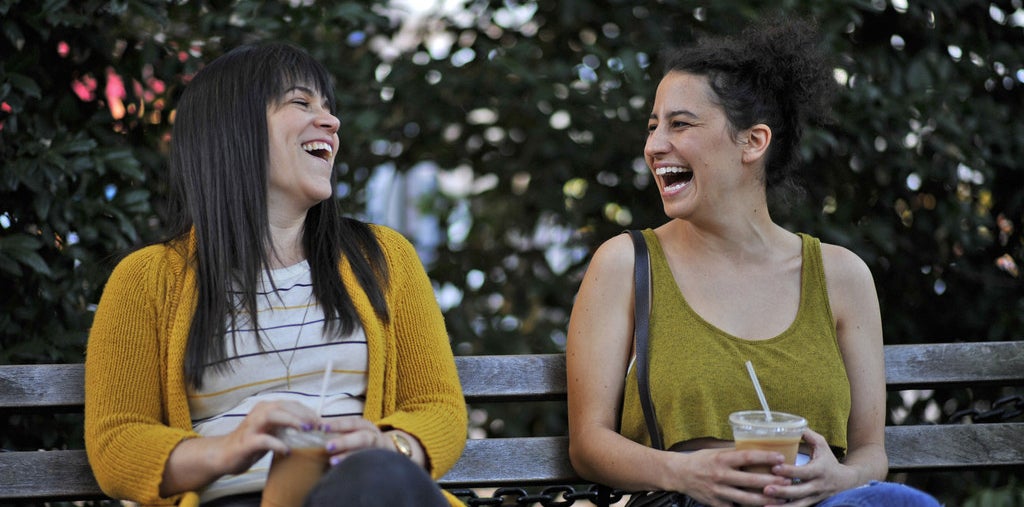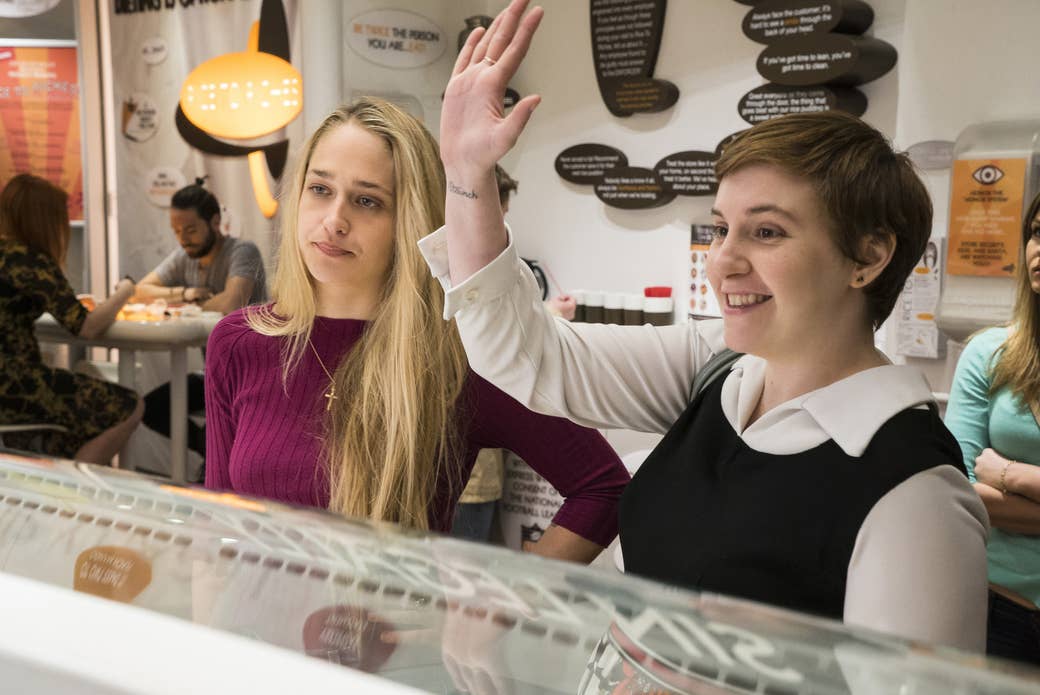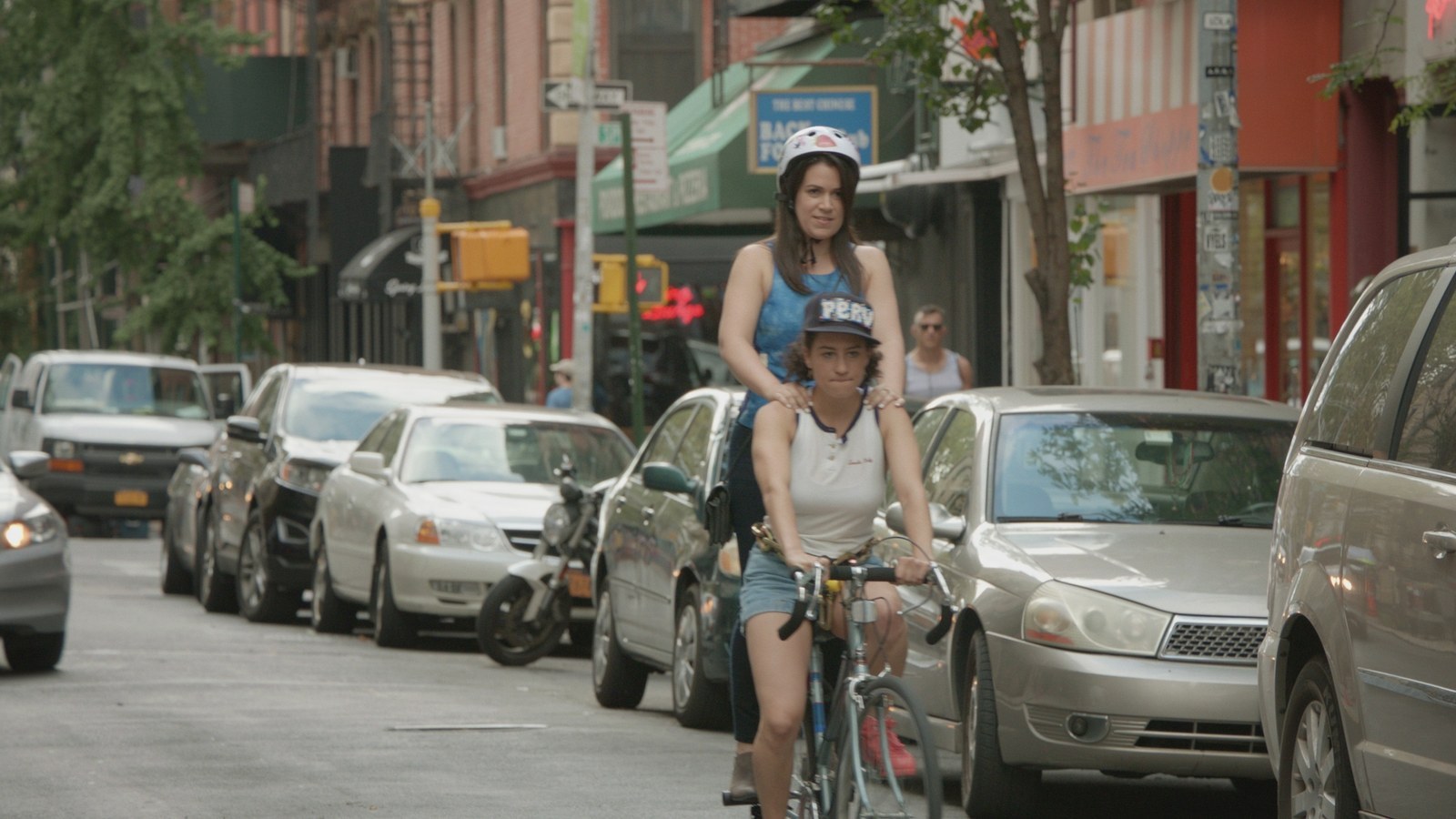
Abbi Jacobson (left) and Ilana Glazer in a scene from Broad City.
When Broad City premiered in 2014, the comparisons between the Comedy Central show and HBO’s Girls were immediate and inevitable. Here were two half-hour comedies about white twentysomething women living in New York, enduring the drudgery and emotional turbulence that’s an attendant feature of those years.
Both shows enjoyed media attention disproportionate to their ratings. (Girls averaged only half a million viewers this season, while Broad City did a bit better with 600,000. Compared with the Game of Thrones season premiere's 8 million viewers, that’s chump change.) But the discrepancy between TV ratings and critical scrutiny is inevitable with two TV shows that reflect the very specific travails of low-paid, creatively inclined New Yorkers, aka the kind of people who churn out copy in the Think Piece Age. The problem with media hype, however, is that it tends to flatten nuance while inevitably attracting backlash. In the case of Girls, first the show was sacrosanct ("Girls Is a Brilliant Gem For HBO"), then it was racially problematic ("We Need to Talk About the White Girls on ‘Girls’"), then it was overrated ("‘Overrated: Lena Dunham’s ‘Girls’"), and now it has been mostly ignored (this season’s ratings were among its lowest). Which is fine. Television audiences continue to become more niche. But it’s a little unfortunate because Girls and Broad City have just completed two excellent seasons — seasons that paint compelling portraits of deep, binding friendships between women.
For the first time in American history, there are more single women living in this country than married ones. And as Rebecca Traister declared in a recent op-ed in support of her new book, All the Single Ladies (which has just been optioned for TV), this demographic shift brings to light the meaningful platonic relationships women have with each other that can sometimes outlast romantic ones. The rabid popularity of the Elena Ferrante novels, the proliferation of #squads and #covens, and the fawning over of such pop-culture besties as Amber Rose and Blac Chyna are indicative of this tidal change. Even if the cynic can see the dry-eyed calculations behind Instagram posts and hashtags, it is hard to deny the symbolic power of witnessing female camaraderie. (Especially in contrast to female bitchiness, a persistent trope throughout film and television.)
Shows such as Golden Girls, Sex and the City, Girlfriends, and Living Single have served as the guiding light in exploring the interactions between a group of women. Friendship was the central conceit of these comedies, but there was always an undercurrent of low-grade antagonism between certain characters (Dorothy’s pointed jabs at Blanche, Toni and Maya’s ruthless back-and-forth, Regine’s literal wig-snatching) that provided comedic fodder — these were traditional half-hour sitcoms, after all. Only Sex and the City broke out of that mold (and even then, not always). You could actually believe that Carrie, Samantha, Miranda, and Charlotte were friends, and they were there for each other during particularly arduous moments: breakups, divorce, childbirth, cancer. But these women were older, established in their careers, single, and actively searching for romantic partners.
What’s significant about Broad City and Girls is the way they center friendship among the twentysomething set (now the largest living generation in the country), when so much else during that age is transient: jobs, identities, apartments, paramours. As the hype over these shows has ebbed, their most recent seasons have doubled down on this premise. They make a case for the primacy of friendship above all else, even when — especially when — it’s under threat.

The titular women in Girls aren’t a particularly likable bunch. This is a problem in a society where we still expect our female TV characters to be aspirational. Self-obsessed Hannah, aggressively passive-aggressive Marnie, self-destructive Jessa, and naive Shoshanna wear their flaws openly. They are selfish and prone to making impulsive, often terrible decisions, and the most recent season of Girls does nothing to change that narrative. But what this season does convey, like other seasons haven’t quite, is how often friendships are formed out of habit, and the loyalty that’s created in spite of that. While these women may not particularly like each other, they are still committed to one another.
How well do you know your friends?
The relationship between Hannah (Lena Dunham) and Jessa (Jemima Kirke), in particular, is one that has been compelling in its incongruity. Hannah is a self-indulgent, aimless (though occasionally witty) aspiring writer, and Jessa is a golden-haired mid-Atlantic-accented flaneur with a drug problem. But they connect. They are best friends. Their relationship has always had an element of give-and-take, with Jessa mostly taking (think of Jessa abandoning Hannah at the train station after a frustrating conversation with her father in Season 2). When the writers introduce a threat to their kinship in the form of Jessa’s burgeoning romantic relationship with Hannah’s ex-boyfriend Adam (sparked by an impulsive, though predictable kiss in this season’s splendid season opener), it tests the bonds of their relationship in a deep way.
The moment Hannah realizes that Jessa and Adam are together is one of the show’s finest, cinematically. In a conceit that is very Brooklyn™, Adam is performing in an interactive play about Kitty Genovese, the woman who was notoriously murdered outside her apartment building while neighbors allegedly looked on in 1964. Two buildings adjoined by a courtyard serve as the stage so the audience can walk from room to room and watch different neighbors perform concurrent vignettes. The setting makes for some droll comedy. (“This is so unrealistic,” Marnie hisses at one point.) But the bystander conceit works well here: How well do you know your neighbors? How well do you know your friends?
During the climax of the play, Genovese’s murder, a red spotlight shines on two statues in the courtyard: one of the killer, the other of Kitty Genovese crouched in fear. Automated screams punctuate the air. As Hannah looks out the window to see what’s happening below, Jessa smokes her cigarette on the fire escape and smiles pointedly at someone. The camera pans towards the object of her affection, Adam, sitting by the windowsill the next building over, also smoking a cigarette. Brenda Lee’s luscious “Someday You’ll Want Me to Want You” gets louder, diegetic, as the camera slowly zooms in on Hannah. We register the shock on her face as she realizes that her best friend and her ex-boyfriend are sleeping together. Is the metaphor too apt? Perhaps. But sometimes a betrayal of that sort can feel like a murder, especially in your twenties, when every emotion is heightened to the nth degree.
While the other women are learning to find autonomy, Hannah is still dependent on her friends. When she breaks up with her boyfriend in typical Hannah fashion — at a truck stop, just as they’re about to embark on a summer road trip — she’s stranded and reaches out to Marnie and Jessa, her two best friends, to get her out of a bind. But when she calls Jessa, who confirms Hannah’s suspicions about her relationship with Adam, Hannah hangs up. It’s too much to bear.
"You know people hate me. I’m a hateable kind of person."
Hannah’s rebuff is at the forefront of Jessa’s mind in the season finale. Jessa cannot stop obsessing over Hannah’s reaction to her relationship with Adam. When Adam tells Jessa that he can’t stand it anymore, she delivers this standout monologue:
“Hannah is my dearest friend. She will always come first. We may not be talking right now and I hope to god that that changes. So you saying that she’s not in our lives anymore, doesn’t work for me. You know people hate me. I’m a hateable kind of person. I don’t know why, I can’t help it. Maybe it’s because I have a big ass and good hair, but I know — I know — that I have principles, and one thing I don’t do is steal people’s boyfriends.” (This sentence contradicts Jessa's actions in earlier seasons, but the sentiment holds.)
“But you ruined that, don’t you see that?” Jessa continues as Adam stares at her stone-faced. “I’ll never forgive you. I will never forgive you.”
The argument escalates into a big, overly dramatic fight.
But the takeaway is that somehow the friendship between Hannah and Jessa is worth fighting for. Even though Jessa has chosen Adam, she mourns the loss of her friend. Friendship trumps romance. It is that important. It’s that big a deal.
The threat of betrayal isn’t as severe in Broad City, a show that attracts a small but passionate fanbase because of the symbiotic closeness between the two main characters, zany Ilana and the more reserved Abbi, played by real-life best friends Ilana Glazer and Abbi Jacobson. Their friendship has #goals all over it. They Skype from the bathroom and amuse each other with weird, hypothetical questions (“Which one of those dogs would you sleep with?”).
Broad City's first-season episodes — like the series of YouTube shorts that helped turn the show into a Comedy Central half-hour program — are sweet, bite-sized nuggets of humor. They depict the quotidian struggles of early twentysomething life in a big city through a gentle, surreal lens. The friends have disappointing sex, get locked out of their apartments, and struggle with annoying roommates. The brokeness of those first few years out of college, for aimless, adrift graduates is something a lot of TV shows don’t portray. That in itself is enough to keep the faithful going, and as a result, the show risks getting stale. Fortunately, the show’s writers chose to quietly up the stakes by introducing tension in Broad City’s third season. There’s the potential for a real fissure in the dynamic of Abbi and Ilana’s friendship, in ways that feel authentic to the low-key tone of the show: cue two men.
After 18 months of casual dating, Lincoln, the affable dentist played by Hannibal Buress, tells Ilana he is breaking up with her. Sitting on the unwieldy green chairs in Madison Square Park, Ilana, who has been the instigator of their open relationship, at first cannot comprehend that he is ending things with her. “But we can still hang out as friends, obviously?” Ilana asks.
Lincoln responds: “I don’t think we’re just friends, so…” A pause. “No.”
That is the radical notion of the series, the ways in which all these other things may fall away, but their friendship for each other is the glue.
Abbi, meanwhile, has been sleeping with the adorably earnest and occasionally grating Trey, her co-worker at the gym. (In one hilarious scene, while they're giving each other head in the shower, Trey asks Abbi on a date. She surprises herself by saying yes, and Trey is so overjoyed he orgasms.) But there’s still some residual shame from last season’s Trey incident where he hosted a party so lame that Ilana insisted on leaving the premises. And so Abbi assumes that Ilana would be mortified to learn about their budding relationship. A date at a fancy restaurant — the same fancy restaurant where Ilana and her parents are dining — results in an extended homage to Mrs. Doubtfire’s dinner-party scene as Abbi attempts to be both an attentive date and a supportive friend. (Ilana’s mother ropes Abbi into sitting at the family’s table in celebration of Ilana’s parents’ anniversary.) All goes wrong, and Abbi is found out when Ilana’s mother chokes and Trey comes to the rescue. Ilana exits the restaurant hastily, and, in the series’ most poignant moment, cries. Abbi rushes to comfort her. “I will never keep a secret like that from you again,” Abbi says. “It’s not even that. Lincoln broke up with me,” Ilana says, sobbing. “And he doesn’t even want to be friends. He never really did.”

The episode ends with the women sitting in a bathtub together (how Girls-esque!) passing a joint and confessing the other things they may have left unsaid. Their friendship comes first. That is the radical notion of the series, the ways in which all these other things may fall away, but their friendship, their closeness, their love for each other transcends all else. It’s fitting, then, that in the two-part season finale, all the questions regarding boys — is Lincoln gone for good? What will happen with Trey? — are thrown aside. It’s the Bechdel test, perfected.
In the book The Social Sex: A History of Female Friendship, a work that inevitably fails to live up to its daunting title, the authors, Marilyn Yalom and Theresa Donovan Brown, write about how the median age for women’s first marriages dropped in the 1950s during the postwar economic boom. The rise of the feminist movement in the ’60s precipitated a reversal, and now, some 50-odd years later, single millennial women are a potent cultural force and so are their friendships.
For the twentysomethings in our TV shows, that’s unlikely to be the case forever. Girls creator Lena Dunham is 29, as is Glazer, while Jacobson is 32. Girls could have reasonably ended this season (as it stands, it has one more season left). Broad City, meanwhile, has been renewed for a fourth and a fifth season, but both Glazer and Jacobson seem aware of the essentially ephemeral nature of their show. “It doesn’t feel like it should exist forever. Just because of who they are,” said Jacobson in an interview with Entertainment Weekly in April. “It’s supposed to capture that certain part of life.”
The perpetual hangout sitcom, where actors visibly age but the characters don’t, these shows are not. Which is fitting. They will move on, move away, maybe settle into married life with kids, or not. They will certainly have less time. The dominant, overwhelming, emotionally draining tribulations of those twentysomething years will fade. But the impermanence of those friendships and the ability of these shows to capture them so aptly will not.
